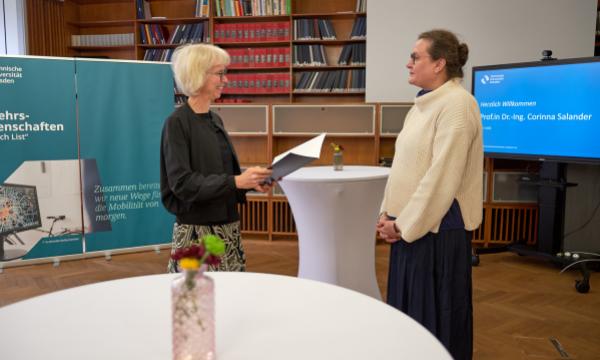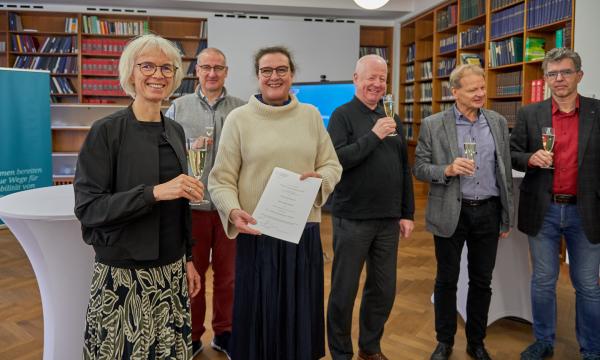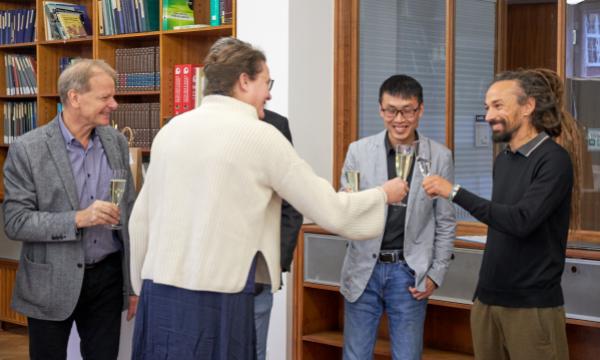
You are here
Honorary professorship
We warmly welcome Prof. Dr.-Ing. Corinna Salander as honorary professor for railway systems engineering at the Institute for Railway Systems and Public Transport, starting November 1, 2025.
Corinna Salander's professional career has already taken the physics graduate to numerous renowned institutions in research, industry, and politics. After graduating from Kiel University, Corinna Salander earned her doctorate in electromagnetic field theory at Clausthal University of Technology. This was followed by positions at Deutsche Bahn AG, the European Union Agency for Railways (ERA), and Bombardier Transportation GmbH, before she was appointed professor of rail vehicle technology at the University of Stuttgart. Her next appointment took her to Dresden as founding director of the German Center for Rail Traffic Research (DZSF). During the last legislative period, she headed the Railways Department at the Federal Ministry of Digital and Transport (BMDV).
Corinna Salander has always remained true to her passion for rail transport. Her connection to Dresden has now brought her to our faculty as an honorary professor. We spoke with her about her enthusiasm for the railway system and asked her what impulses she would like to bring to our students' education.
LD: Professor Salander, welcome at our faculty. Thank you very much for taking the time to talk to us today.
CS: Thank you very much for the warm welcome.
LD: What fascinates you about the complex field of railway systems engineering, and where do you currently see the most exciting areas of development?
CS: I am a physicist by background, and I am fascinated by something very physical about the railway system, namely the contact between the wheel and the rail. Power is transmitted via a contact surface that is only about the size of a penny, and this creates the incredible potential to pull a heavy train via such a small spot and then transport it in a very, very energy-efficient way.
EEven though energy efficiency is a fundamental aspect of rail transport, there is still room for optimization, for example in the use of static friction or in drive technology - will it be hydrogen, will there be more electrification, or will hybrid drives become more widely used? I think that automated driving will also continue to develop. On the other hand, I believe that we already have a technologically advanced level of development in the rail system. Many things now need to be put into practice. However, this often means that the infrastructure must also be upgraded accordingly in order to ensure, for example, that energy can be supplied in every form. A good example, in my opinion, is the digital automatic coupling, which is close to being ready for use and could stabilize single-unit rail transport, which is currently not economically viable.
LD: You have already worked for or managed many renowned institutions. How do you intend to incorporate your professional experience into the education of our students? What topics would you like to focus on in your teaching?
CS: I teach the course “The Railway System – Stakeholders, Processes, Regulations.” For me, knowledge of how the railway system is structured, which stakeholders are responsible for what, and which regulations, especially European regulations, underpin the whole system is extremely important in enabling future railway professionals to operate correctly within the system and thus advance it. Of course, I can develop a train, an infrastructure element, or even software. But at some point, I reach the stage where I have to approve the whole thing in order to put it into operation. And that is a focus of my lecture, which I believe is a very, very important addition to the faculty's existing and already very comprehensive range of courses.
LD: What do you think the railway system of the future will look like, and what skills do you want to teach our students to help them make this vision a reality?
CS: The railway system will always be a technical system in the future. It is characterized by the interaction between vehicles and infrastructure. It is therefore extremely important for young professionals to understand the railway system both in their respective fields and as a whole. In my opinion, this is very well reflected here at the faculty by the many professorships covering a wide range of topics. In my lecture, however, I do not focus on the technical aspects, but on the regulatory system structures and their influence on technology and vice versa. As I said, it is a supplement with content tools for students that will enable them to better design the railway system of the future.
LD: What should students know about you and what can they expect from you?
CS: I have been working in the railway industry for over 30 years now. I became a railway enthusiast when I started my dissertation and have remained committed to the industry ever since. I have experienced various aspects of the industry: I have worked in research, technical and operational safety, and also in licensing. I have become familiar with European regulations and, most recently, the political perspective. I bring a wide range of knowledge about the structures with me. This is how I came up with the idea for this lecture, which introduces all of these players and processes, some of which I have had the opportunity to experience myself. Students can definitely expect insights into real life in the railway industry.
LD: What are your wishes for future collaboration between universities, industry, and railway companies—and what personal contributions would you like to make in this regard?
CS: It is very, very important to me that companies recognize the importance of research for their own development and get involved. In everyday business life, I also see enormous potential in the area of standardization, where in some cases there are not enough knowledgeable employees who can be seconded to the standardization committees. In my view, both issues require close cooperation between research institutions and industry. And I would like to contribute to this cooperation.
LD: Thank you very much, Corinna Salander. All the best for your work here at the faculty.
CS: Thank you very much.
Originalautor
Honorary professorship
An honorary professorship is an honorary, part-time teaching position at a university that is awarded to individuals with outstanding achievements in science or practice. The appointment is linked to long-term teaching duties and allows the holder to use the title of professor.
Contact
It is extremely important for young professionals to understand the railway system both in their respective fields and as a whole. In my opinion, this is very well reflected here at the faculty by the many professorships covering a wide range of topics.



